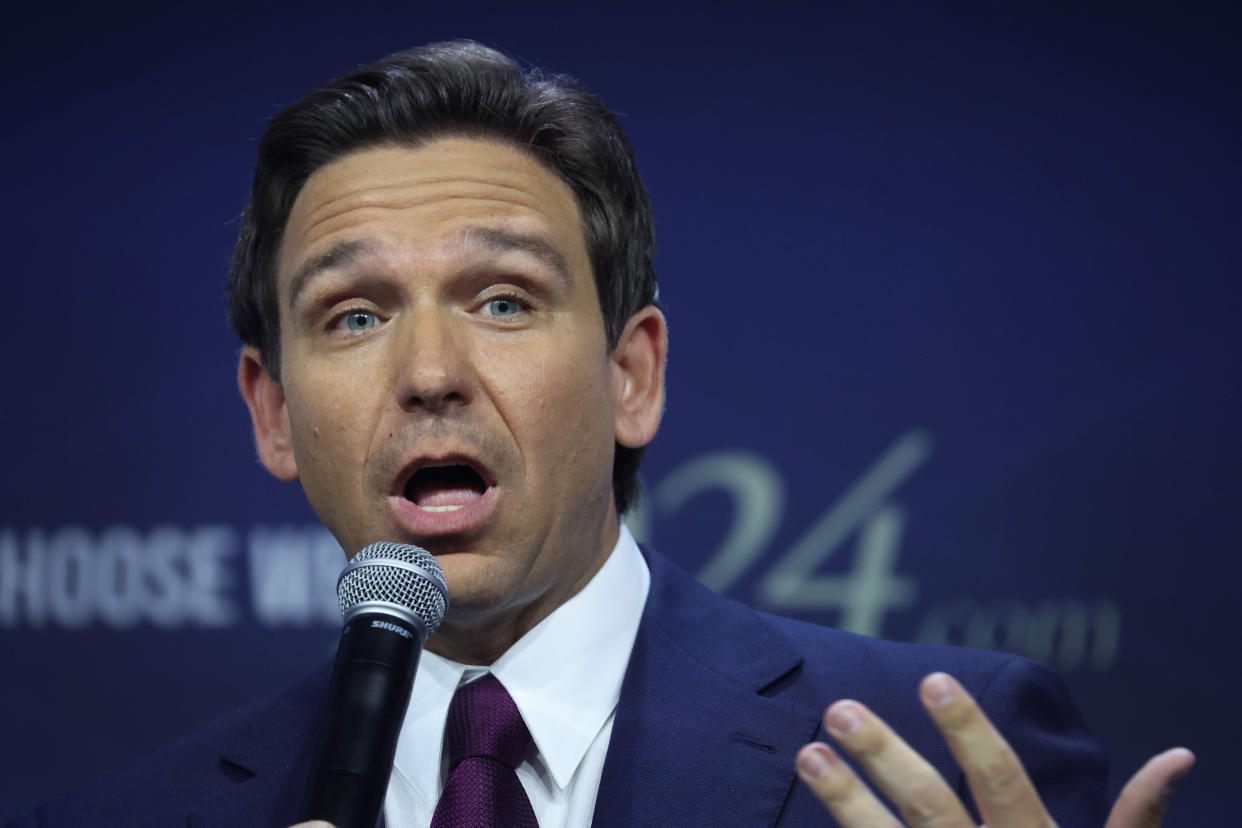Editorial: State of the state? Delusional, according to DeSantis

- Oops!Something went wrong.Please try again later.
Gov. Ron DeSantis brought his failing presidential campaign back to Florida Tuesday in the guise of his annual State of the State speech, delivered to a joint session of the Legislature and dozens of other dignitaries.
The setting was the state Capitol in Tallahassee and the audience included most of the state’s political infrastructure. But DeSantis could have been giving his stump speech to a Rotary Club in Iowa, which holds the first-in-the-nation nominating caucuses next Monday night.
Most mentions of Florida were mere puffery, with little indication of what DeSantis intends to accomplish. In full-on campaign mode, DeSantis bashed the Biden administration’s immigration policy, the size of the national debt, and high taxes and urban decay in New York, Illinois and California.
By contrast, he said Florida is “a refuge for freedom and sanity.”
As we’ve seen before, DeSantis has different definitions for those words than many Floridians do.
Where is DeSantis headed?
The governor’s annual speech (which you can view here) formally kicks off the 60-day legislative session. It has traditionally been both a self-congratulatory look back and a table-setting talk that sets the agenda for the challenges ahead.
The latter got short shrift. DeSantis repeatedly glossed over Florida’s worst problems in ways the national media would not be likely to catch.
Nowhere was that on greater display than when DeSantis talked about the needs of Florida’s children. He twittered on about protecting children from the evils of social media (which is the prerogative of parents and not the state’s job) and claimed he’d made it “tax free” to raise a child, which is a ludicrous claim — a handful of sales-tax breaks do not change the fact that Florida’s tax burden falls disproportionately on the shoulders of its lowest income families.
He barely mentioned health care access, and certainly didn’t acknowledge that more than 750,000 Floridians have been dropped from Medicaid rolls via disenrollment. Nearly 300,000 of those are children. Federal officials say many of those who were dropped were still eligible for coverage, yet Florida is the only state that didn’t ask for more time before giving them the boot. DeSantis didn’t attempt to explain, let alone fix, that.
He boasted about his efforts to strip “woke ideology” from public schools and universities and bragged about “protecting” children, but didn’t mention that nearly two-thirds of fourth graders are not proficient in reading. And while DeSantis brags about boosting access to school-choice vouchers (but not the $4 billion price tag that benefits many families that could easily afford private-school tuition on their own), he ignored the crisis in child-care affordability for low-income families. Child care can carve more than 25% out of a single mother’s income, but only 15% of Florida families poor enough to be eligible for child-care vouchers get them.
House Speaker Paul Renner acknowledged the cruel effects of Florida’s failure to provide resources for children and families in need of mental health care. And Senate President Kathleen Passidomo offered plans to improve access to healthcare and recruit more providers to Florida, but it was disheartening to hear her flat-out reject the idea that Florida would expand Medicaid to low-income working Floridians.
They, at least, are admitting reality. In too many areas, the state of the state is sacrificed — along with Florida’s children, its low-income working families and its vulnerable seniors — on the altar of political expediency, through culture-war sideshows and attacks on academic freedom, school books, transgender teens and LGBTQ people.
Other big issues missing
The deepening property insurance crisis received only a single passing reference: “Let’s reduce the cost,” he said, without explaining how. Skyrocketing car insurance rates? Never mentioned. Neither was a housing crisis that makes Florida increasingly unaffordable for millions of people.
DeSantis also boasted about Florida’s abortion restrictions, a concealed-carry gun law, a crackdown on diversity, equity and inclusion policies, restrictions on social activism on college campuses and sending 100 Florida Highway Patrol troopers to Texas to help that state fight illegal immigration.
None of these are the state’s job, and nobody was crying out for them.
The governor also cited as a point of pride that Florida has the fewest full-time state employees per capita of any state (82 employees for each 10,000 residents, he said). That may explain why DeSantis had to assign hundreds of National Guard troops to keep order at state prisons staffed by too few correctional officers, why so many underpaid adjunct instructors are teaching at Florida’s universities, and why motorists seldom see a state trooper on its interstates and expressways.
On the positive side, DeSantis spoke of raising teacher pay, importing cheaper prescription drugs from Canada, and expanding workforce education and environmental protection — all laudable goals.
It was clear that the governor who was re-elected in 2022 by an astounding 19 percentage points is now a diminished figure. He still wields a veto pen, a powerful political tool, but he can’t expect people to fall in line for fear of offending the next president of the United States. Meanwhile, he’s done little to articulate a realistic road map for the next 59 days of the legislative session — leaving Floridians, including the Legislature, in the dark about what he plans to do as governor now that it seems likely he’ll be sticking around for another two years.
____
The Orlando Sentinel Editorial Board includes Editor-in-Chief Julie Anderson, Opinion Editor Krys Fluker and Viewpoints Editor Jay Reddick. The Sun Sentinel Editorial Board consists of Editorial Page Editor Steve Bousquet, Deputy Editorial Page Editor Dan Sweeney, editorial writer Martin Dyckman and Anderson. Send letters to insight@orlandosentinel.com.

